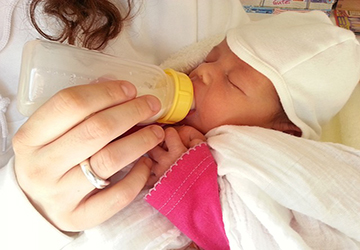Premature Infants
A premature baby, or premature baby, is a baby born before 37 weeks of gestation. Because of their organs and systems' immaturity, they risk various health complications.
Some common health problems that premature babies may face include respiratory distress syndrome, jaundice, anemia, apnea, hypothermia, and feeding difficulties. They may also be at risk for long-term health problems, such as cerebral palsy, developmental delays, and vision or hearing problems.
Parents of premature babies need to work closely with healthcare professionals and follow their care recommendations and follow-up appointments. Many premature babies can grow into healthy, thriving individuals with proper medical care and support.

Challenges of Premature Babies
Challenges for premature babies include:
l Respiratory distress syndrome: Premature infants may have difficulty breathing due to underdeveloped lungs, resulting in respiratory distress syndrome.
l Feeding difficulties: Premature infants may have feeding difficulties, including sucking and swallowing. They may require special feeding techniques or tube feeding.
l Apnea: Premature babies may experience pauses in breathing, called apnea, which reduces the oxygen supply to the brain.
l Infection: Premature babies are at increased disease risk due to their underdeveloped immune systems.
l Unstable body temperature: Premature infants have difficulty regulating their body temperature and are prone to hypothermia or hyperthermia.
l Jaundice: Premature babies are at higher risk for jaundice, which causes yellowing of the skin and eyes due to excess bilirubin in the blood.
l Developmental delays: Preterm infants may be at risk for developmental delays, including motor skills, cognitive development, and language development.
l Vision and hearing problems: Premature babies may have vision and hearing problems due to immature nervous systems.
Premature babies need specialized care and support to address their unique challenges and support their health and development.
How to deal with the challenges of premature babies
Coping with the challenges of a premature baby can be difficult, but several strategies can help babies and parents cope with the situation:
1. Get support from a healthcare professional: Premature babies need specialized medical care. Working closely with a healthcare professional is essential to ensure the best possible treatment for your baby. This may involve working with neonatologists, nurses, and other specialists to monitor the baby's health and development.
2. Connect with other parents of unborn babies: Talking to parents who have gone through similar experiences can be a valuable source of support and information. Many hospitals have support groups for parents of premature babies or have online forums and communities where parents can connect.
3. Take care of yourself: Caring for a premature baby can be exhausting, so parents need to take care of themselves too. This may mean getting enough rest, eating a healthy diet, and seeking the support of friends and family.
4. Be patient: Premature babies may experience developmental delays; patience and understanding are essential when dealing with these challenges. Celebrating the small milestones and achievements your baby makes along the way is also necessary.
5. Be proactive with developmental interventions: Many interventions can help premature babies develop and thrive, including occupational therapy, physical therapy, and speech therapy. Parents should work closely with healthcare professionals to identify and address developmental delays early.
By following these strategies, parents can help their unborn babies overcome challenges they may face and reach their full potential.

What should premature babies avoid?
Preterm infants may require special care and attention, including dietary and lifestyle changes, to support their growth and development. Here are some things that premature babies should avoid:
Infections: Premature babies have weaker immune systems, making them more susceptible to infections. To prevent disease, it is essential to limit exposure of premature babies to people who are sick and to ensure that everyone who comes into contact with the baby washes their hands and wears a mask.
Overstimulation: Premature babies can quickly become overstimulated, leading to stress and exhaustion. To prevent this, it is essential to keep the baby's environment calm and still and limit the number of visitors.
Low temperatures: Premature babies can have trouble regulating their body temperature, so keeping them warm is essential. However, they should avoid exposure to frigid temperatures, which can damage their delicate bodies.
Certain medicines: Premature babies may not be able to tolerate certain drugs or may need lower doses because of their small size and underdeveloped organs. Always consult your pediatrician before giving any medication to a premature baby.
Solid foods: Premature babies may be unable to digest solid foods until they are at least six months old and, in some cases, even later. Breast milk or formula is the best source of nutrition for premature babies.
Unsafe sleeping environment: Premature babies should always sleep on their backs on a hard, level surface without loose bedding or soft objects. This helps reduce the risk of sudden infant death syndrome (SIDS).
Ways to support premature babies
If your baby was born prematurely, it might need special care to support its development and growth. Here are some ways you can help premature babies:
Give kangaroo care involves holding your baby's skin against your chest. This can help regulate their breathing, heart rate, and body temperature and promote intimacy.
Provide proper nutrition: Premature babies often have feeding problems and may require special feeding techniques or formulas. Work with your healthcare team to ensure your baby gets the right food.
Keep the environment calm: Premature babies can easily be overstimulated, so keeping those around them clear and quiet is essential. Minimize noise and light, and limit visitor numbers if necessary.
Follow your doctor's instructions: Your healthcare team will give you instructions on how to care for your premature baby, including when to breastfeed, take medicines, and then see your doctor. Please follow these instructions carefully.
Diploma
Premature babies do not develop at the same rate as full-term babies. Monitor your baby's weight, growth, and development, and report any concerns to your healthcare team. Finally, caring for a premature baby can be stressful. Seek support from family, friends, or a support group to overcome challenges.


